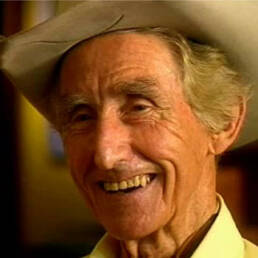These stories may contain descriptions of childhood trauma and abuse. Aboriginal and Torres Strait Islander people should be aware that this website may contain images, voices or names of people who may have passed away. If you need help, you can find contact details for some relevant services on our support page.
Iconic Australian country music singer, Smoky Dawson (1913-2008), was in an orphanage and foster care as a child.
Smoky Dawson was born Herbert Henry Brown in Collingwood, Victoria. His parents, Parker Frederick Brown and Olive Muir, who married in 1905, had five children, ‘Herbie’ being the second youngest.
Olive Brown died in 1919 when Herbie was six. Parker Brown remarried, marrying Herbie’s aunt, Olive’s sister.
…she stepped in to take the place of my mother to keep him in order. She was the only one that could control him… She used to give me quite a few thrashings too, with the same lead (Dawson).
Parker Brown worked in a dispensary and was a singer too. He was also a violent drunk.
I remember a time when on the Saturday, football day, he would be home all day and those were the days I dreaded because he was with me all the time. Send me over to the pub to get the beer…And I’d run back with it. And he’d say, ‘Where’s the change? I gave you more than that’. And I’d get a hiding. He just manufactured things (Dawson).
Herbie began running away, only to be belted when he was found and returned to his father. On one occasion, however, he ran to his aunts, showed them the welts on his back, and the aunts took him down to the police station. Herbie was held in an orphanage until the matter went to court, and he was then permanently removed from the ‘care’ of his father. Herbie was nine years of age.
For Smoky Dawson, St. Vincent de Paul’s Boys’ Orphanage in South Melbourne was a “wonderful haven”, at least for a while. Unfortunately, there were still beatings to be endured.
Respite came when he was taken in for three weeks by the Carew’s over the summer holidays. This experience gave the twelve-year-old such a sense of joy and freedom that he determined to run away rather than return to St Vincent’s.
The lad was taken in and employed by a farmer for three years. He later did other working-class jobs, including working in a tannery while playing guitar on the weekends and singing with his younger brother, Ted.
In 1934 Dawson formed a group and began broadcasting on Australian radio. Seven years later he signed with Columbia Records and toured the country with I’m a Happy Go Lucky Cowhand.
Smoky Dawson continued his singing career until his death in 2008.
Amongst other awards, he was inducted into the Hands of Fame in Tamworth in 1977, awarded an Order of the British Empire in 1983, and made a Member of the Order of Australian in 1999. He was also inducted into the ARIA Hall of Fame in 2005.
With all his success, Smoky Dawson could still be taken back to his childhood and the violence he experienced:
… when I hear the news on what is about now about violence, and all the things that are happening to kids, it does bring it back to me, so you are never really rid of it because it’s grown to such proportions now it’s part of life, isn’t it? Every day there is some kid getting bashed up and when you see so many kids still going on the street, no place to sleep, it brings it home to me, my life again (Dawson).
References:
“Australian Biography Smoky Dawson.” Film Australia’s Australian Biography Series, 1994. https://www.nfsa.gov.au/collection/curated/australian-biography-smoky-dawson
“St Vincent de Paul Orphanage (1855 – 1967).” Find & Connect, 2021. https://www.findandconnect.gov.au/guide/vic/E000061
Image available here.
